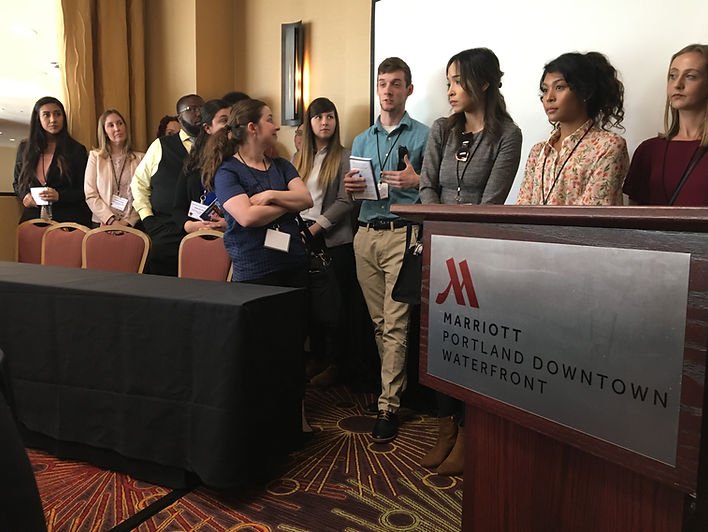
OUR WORK
ONGOING STUDIES
Mapping the Civics Education Landscape: Identifying the Role of Research and Politics in Educational Decision-Making
In ensuring our research has real-world application, it is critical to understand gaps between research production and practical use. This research project will explore how school decision-makers weigh research at the intersections of political and contextual factors, when selecting and implementing civics programming.
This project will: 1) document conditions and strategies to improve research use, and 2) work with community members to develop and test tools to improve the use of research evidence.
This study is funded by the William T Grant Foundation Scholars Program, Principal Investigator: Kornbluh
Institutional Review Board and YPAR Scholars
Youth-led participatory action research (YPAR) engages young people as partners in rigorous research inquiry to guide and inform collective action. Scholars interested in YPAR have notable investment in social justice and activist values, which at times come in direct tensions within their doctoral training and/or professional roles within academia. One monumental hurdle in conducting YPAR is obtaining approval from the Institutional Review Board (IRB).
Working with colleagues at Fordham, Florida State University, Boston University, and the larger Life Course Intervention Network (YPAR Node), we will: 1) document challenges and choice points for developing IRB YPAR-focused applications, 2) identity strategies to support both IRBs and YPAR researchers in this research, and 3) disseminate resources and tools.
This study is funded by Adolescent & Young Adult Health Research Network: National Resource Center, Co-Principal Investigator: Kornbluh, Hoyt, Abraczinskas
Communicating ‘Truth:’ Consumption and transmission of polarized information amongst young people in a divided society
Exposure to, and biased processing of, polarized narratives perpetuate intractable group conflict. Developing epistemic vigilance, or methods to track and evaluate the quality of testimony of these narratives, can lead to lasting, positive societal change. In this international project led by the University of Belfast, we aim to explore dynamic socio-ecological influences on epistemic thinking that may exacerbate or attenuate polarization.
We will use mixed methods across three strands of research to investigate individual-, interpersonal-, structural- and cultural-level influences on the transmission and consumption of polarized information among young people in Northern Ireland, a historically divided society. Specifically, the YEP lab will conduct qualitative interviews to further elucidate the role of culture and social context, as well as cognitive thought processes in information consumption, transmission, and belief revision processes.
This study is funded by the World Templeton Charity Foundation Grant, Co-Investigator: Kornbluh
Exploring neighborhood characteristics as influences on perceived STEM opportunities for underserved youth
In partnership with the Alliance for Educational Solutions (AES) we conducted a research project to survey and hold listening sessions for youth throughout underserved areas within Sacramento, California regarding their vocational and career aspirations with a particular focus on STEM. Youth engaged with their hopes, dreams, and career goals, as well as the opportunities and barriers in pursuing such careers. The project was conducted between May 2023 - July 2023 and from the preliminary findings, recommendations were given for city programming efforts.
Current data analysis, on the information collected from the project, is looking deeper into the influences of neighborhoods and neighborhood characteristics on perceived STEM opportunities in minority youth. This project explores: 1) what neighborhood characteristics modify or inhibit the development of vocational skills, and 2) what effect neighborhoods have on minority youth perception of access to STEM opportunities?
PREVIOUS STUDIES
Exploring the role of Critical Consciousness in Relation to Educational Attainment
Racial and ethnically minoritized students are often disproportionally affected by multi-level systems of oppression within their school and community environments.
This study focused on the role of critical consciousness for racially and ethnically minoritized students navigating higher education. Longitudinal surveys, focus groups, ethnographic field notes, and photovoice were used to capture students' lived experiences.
Findings highlighted the important role played by adult helpers in supporting students in relation to student learning, academic achievement, and school engagement at cross-cultural programs and freedom schools. Adult helpers provided aid to students in developing skills in cultural humility, facilitating consciousness raising discussions (i.e., exploring issues of systemic inequality), and exploring and celebrating ancestral resiliency.
Notably, critical consciousness provided students with a framework and language to name experiences of oppression, and instilled in them a sense of agency to combat such systems while persisting within their educational environment
This study was funded by the Spencer Grant Foundation, New Civics Initiative (Principal Investigator: Kornbluh)
Tapping Into Children's Understandings of Inequality
Tapping into children and adolescent conceptualizations of inequality is key to understanding how they make sense of the world, and how this understanding relates to their own identities and personal narratives in relation to agency, educational attainment, and overall well-being.
In partnership with Dr. Connie Flanagan (University of Wisconsin-Madison), data were collected from 598 participants within the U.S. ranging from 6th to 12th grade.
Findings indicated that Black participants and youth from families that had fewer resources saw U.S. society as more stratified as compared to white participants and those with more resources who chose a more egalitarian image of U.S. society today.
While cognizant of social inequities, these same youth were also more likely to internalize meritocratic beliefs surrounding the underlying mechanisms of inequality, thus potentially adopting deficit focused-narratives that have been tied to poor academic, developmental, and health outcomes.
This project was funded by the William T Grant Foundation (Principal Investigator: Flanagan).
Civic Activism, Stress, and Coping during the 2020 Presidential Election
The 2020 U.S. election brought heightened levels of political and social conflict, coinciding with the unprecedented stress and disruption of the COVID-19 pandemic.
This study explored the role of critical consciousness and identity in relation to young peoples' civic activism.
Findings suggest the role of identity, impacted by both privileging and oppressive systems, is associated with distinct types of civic participation (outside of the system versus inside of the system).
Furthermore, opportunities to promote critical consciousness are strongly associated with a range of diverse forms of civic participation (e.g., volunteering, activism in support of the Black community). Findings identify future directions for research design and community programming that can further unpack and bolster racial justice-oriented civic identity development for young people.
This project was funded by the College of Arts and Sciences at the University of South Carolina, and the Society for Community Research and Action (Principal Investigator: Kornbluh)
This study was conducted in partnership with Brooklyn College, Fordham University, Montana State University, North Carolina State University, San Francisco State University, University of Michigan, University of Washington Tacoma, and Wake Forest University.
RECENT PUBLICATIONS
Flitner, A., McQuillin, S., Kornbluh, M., & Thompson, D. (2023). Spotlighting racism in schools: Teacher mentors and the mediating effect of school safety. American Journal of Community Psychology. https://doi.org/10.1002/ajcp.12680
Kornbluh, M. (2023). Making the case for youth participatory action research opportunities to enhance social developmental scholarship. Social Development. https://doi.org/10.1111/sode.12678
Kornbluh, M. (2023). Facilitation strategies for conducting focus groups attending to issues of power. Qualitative Research in Psychology, 20(1), 1-20. https://doi.org/10.1080/14780887.2022.2066036
Middaugh, E., Kornbluh, M., & Felton, M. (2023). Navigating context collapse: A strengths-based approach to building youth civic empowerment. A response to “Blended spaces: Reimagining civic education in a digital era”. Democracy and Education, 31(1), 6. https://democracyeducationjournal.org/home/vol31/iss1/6








